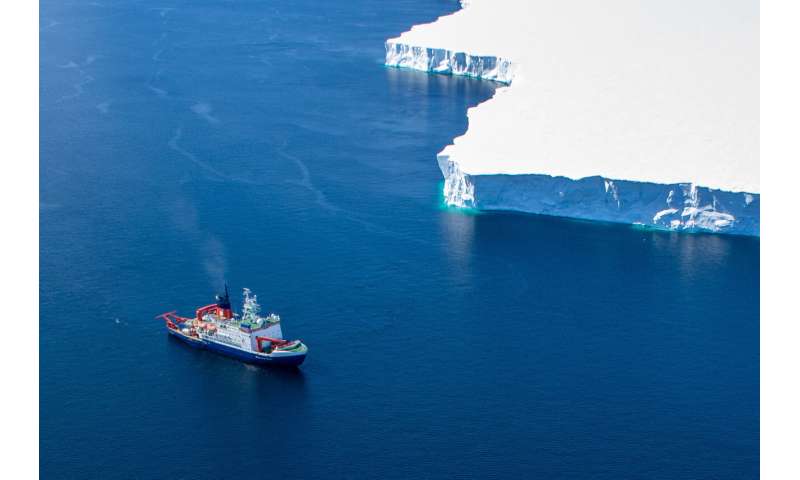Research vessel Polarstern visits Australia for the first time

She has been traveling in the Arctic and Antarctic in the service of research for over 40 years, but there are still areas that are new territory even for the Polarstern: Between two expeditions to East Antarctica, the Alfred Wegener Institute's research icebreaker reached Hobart in Tasmania on 30 January 2024 and will remain there until 6 February.
The German Embassy in Australia, together with the Federal Ministry of Education and Research and the AWI, is inviting representatives from politics, science and society to a celebratory reception on board to mark the first attempt.
Polar research vessels are well known in Hobart, as the Australian Antarctic Research Program is based there and the city is the starting point for expeditions by the research vessel RSV Nuyina. However, Germany's only research icebreaker Polarstern is on site for the first time in its 40 years of service—and this will be celebrated in style: The German Embassy in Australia, together with the Alfred Wegener Institute, Helmholtz Center for Polar and Marine Research (AWI) and supported by the Federal Ministry of Education and Research (BMBF), is inviting around 70 people from politics, research and society to a celebratory reception on 5 February. The Governor of Tasmania will also be there.
The Polarstern crew and participants in the Antarctic expeditions will show the guests around the ship and report on current research into understanding feedbacks between ice, ocean and atmosphere in East Antarctica. Together with the GEOMAR Helmholtz Center for Ocean Research, Kiel and the Christian August University of Kiel as well as their Australian and international partners, the AWI is conducting three expeditions as part of the EASI—"East Antarctic Ice Sheet Instabilities" initiative to investigate the history of the East Antarctic Ice Sheet and its interaction with circulation changes in the Southern Ocean.
Barbara Baker, Governor of Tasmania, says on the occasion of the Polarstern call: "The Polarstern, research vessel of the Federal Republic of Germany, is most welcome in Hobart during the current East Antarctic expeditions. Hobart is proud to be one of the world's five Antarctic gateway cities and is the formal gateway city to East Antarctica. Hobart has a longstanding and highly professional commitment to the care and management of the Antarctic, with many public and private organizations having some form of involvement in Antarctic matters.
"Our city is a center of Antarctic science, education, research, and logistics, with our University of Tasmania Institute for Marine and Antarctic Studies (IMAS) and our Australian Antarctic Division (AAD) having a significant role. Hobart is also the headquarters of the CCAMLR Secretariat and hosts the annual meetings of Members, Acceding States and interested parties, at which critical deliberations help ensure the conservation of Antarctic marine life."
Beate Grzeski, Ambassador of the Federal Republic of Germany to Australia, explains: "Climate action is a high priority for the German government. Internationally, Germany is a driving force in climate action, together with its partners in the 'Climate Club'—of which Australia is also a member. Climate research is an important pillar of German climate foreign policy: the scientific basis is fundamental for understanding the consequences of climate change and advancing climate action.
"Together with Australia, Germany is committed to drastically reducing global and national greenhouse gas emissions, accelerating the global energy transition by expanding renewable energies and supporting affected countries—particularly the Pacific Island states in the region—in mitigation and adaptation. A new component of our commitment are the 'Climate Talks', which will be held in Australia for the first time in 2024 and are intended to stimulate exchange between climate science, politics and civil society.
"As a joint project between the German Embassy Canberra, the Alfred Wegener Institute, the Australia-Germany Research Network, the Tasmanian Government and the City of Hobart, the Hobart Climate Talk, which takes place on the occasion of the visit of the Polarstern, also stands for the close relations in climate and science policy between Germany and Australia."
Antje Boetius, Director of the Alfred Wegener Institute, says, "We hope to learn more about the future from the past interaction of the Earth's climate with the Antarctic ice sheets. Australia is a strong research partner in this respect. We are all concerned that there has been less sea ice in the Antarctic in recent years than ever before since satellite observations began. The current sea ice extent is also far below the long-term trend. Without sea ice, the warm ocean is increasingly gnawing away at the Antarctic ice sheets, as reported by the Polarstern expedition to East Antarctica, which has just ended.
"Unfortunately, the Antarctic ice masses have the potential to cause sea levels to rise by dozens of meters in the coming centuries as global warming progresses. In order to be able to model this more accurately, more and better data is needed through international cooperation. I am very pleased that we can use Polarstern's first port call in Tasmania to plan future research projects with our Australian partners, such as the UN Ocean Decade Program 'Antarctica InSync'."
Already on the weekend before the reception (3 and 4 February), there will be a multimedia and photo exhibition on polar research by the AWI and scientific partner institutions supported by the City of Hobart in the city center. At the "Meet the Scientist" event, interested parties can ask the researchers questions directly. In addition, the German Embassy in Australia will open its "Climate Talks" series on 5 February with a panel discussion that will be broadcast as a livestream. As this will take place at late night for the German audience, a recording will also be available on demand later. Participants are: AWI Director Prof. Dr. Antje Boetius; Prof. Dr. Julia Gottschalk, marine geologist at Kiel University; Prof. Matt King, polar physicist and Director of the Australian Center of Excellence for Antarctic Science (ACEAS); Dr. Klaus Meiners, sea ice ecologist at the Australian Antarctic Division (AAD) and Karen Rees, Tasmanian Antarctic Advocate.
Provided by Alfred Wegener Institute